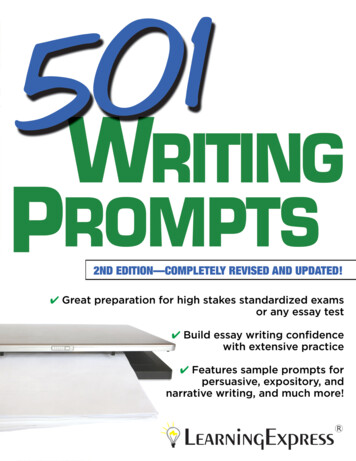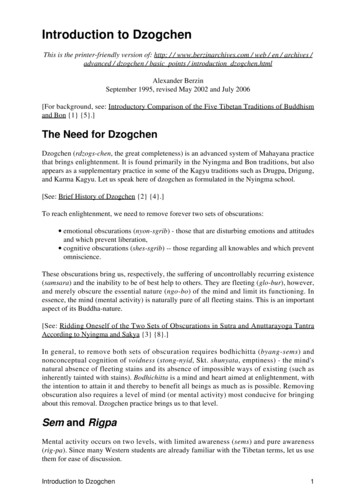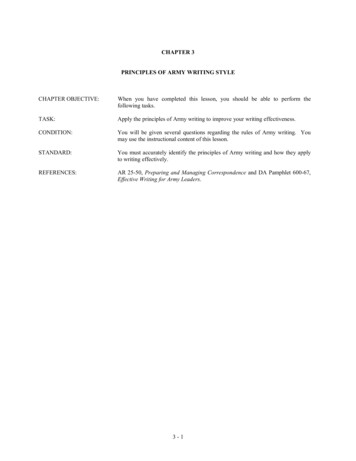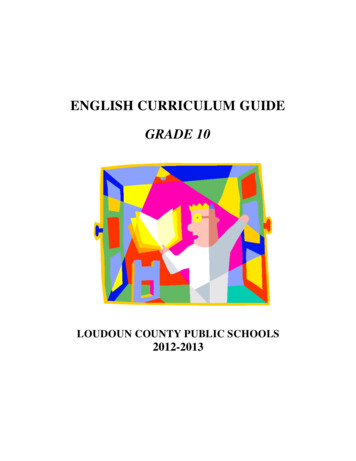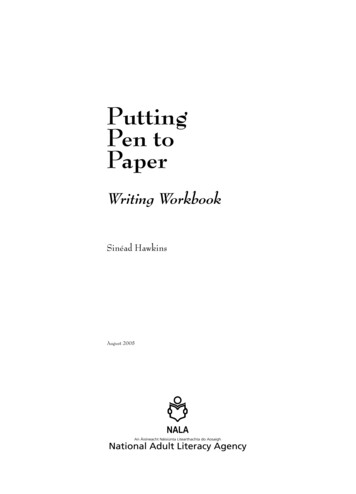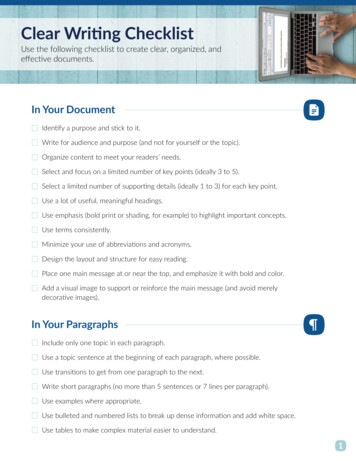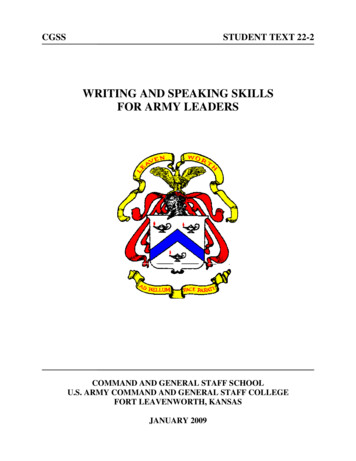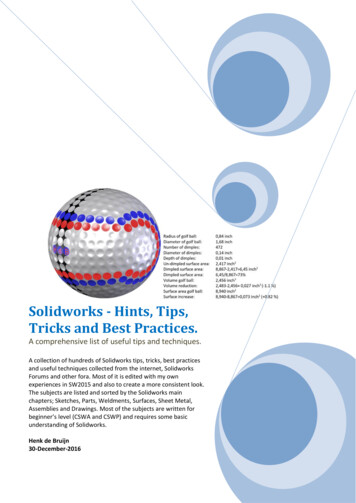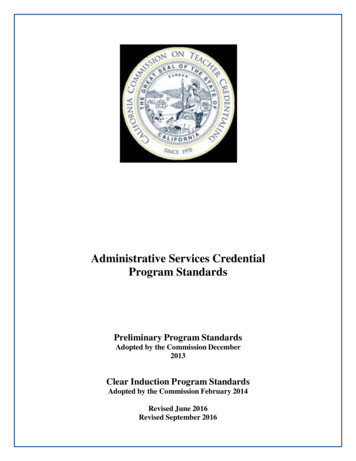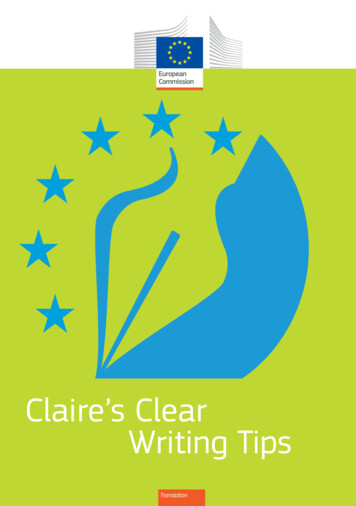
Transcription
Claire’s ClearWriting Tips1Translation
Claire’s Clear Writing TipsClaire is the face of the European Commission’s Clear Writing campaign. As her name (meaning‘clear’ in French) suggests, she is an expert on clear writing. Here she presents some detailed practicaltips to help EU staff avoid common pitfalls and draft more clearly. These tips on writing in Englishexpand upon the guide How to write clearly, which is available in all official EU languages.ContentsSeven key questions. 3Focus on the reader . 4Keep it short and simple (KISS). 5Cut out excess nouns. 9Be concrete, not abstract . 10Prefer active verbs to passive. 11Beware of jargon. 12Take care when using abbreviations, acronyms and foreign expressions. 14Beware of false friends (faux amis). 16.False friend: actual. 16.False friend: assist at. 16.False friend: control. 17.False friend: delay. 18.False friend: dispose of. 19.False friend: element. 19.False friend: elaborate. 20.False friend: eventual/eventually. 21.False friend: expose. 21.False friend: foresee. 22.False friend: project. 22.False friend: punctual/punctually. 23.False friend: report. 23.False friend: respect. 24.False friend: sensible. 24Tips on usage (grammar, vocabulary, punctuation). 25.Take care when using adjectival/adverbial phrases. 25.Take care with the word ‘which’. 25.To use or not to use a comma?. 26.What is the right word or expression?. 27Test yourself!. 29Acknowledgements and further guidance. 302
Seven key questionsFirst things first. Before you start writing, imagine what questions your reader might ask.A clear, well-structured text should answer these ‘seven questions’:1.2.3.4.5.6.7.What is being done?Who is doing it (to whom)?When is it being done?Where is it being done?How is it being done?Why is it being done?How much is involved (resources, time, etc.)?So:Don’t write this:At the appropriate stage, the necessary steps will be taken and sufficient fundscommitted to tackle the problems arising in several Member States.Why?Because it is vague and uninformative, and therefore uninteresting. It provides no clearanswers to any of the seven questions.Instead, write this:Over the next six months, the European Central Bank will provide the governmentsof Ireland, Spain and Portugal with a loan of 10 billion from the emergency fundto help them tackle their debt crisis.Why?Because it is specific, clear and informative.3
Focus on the readerWho are you writing for? Involve them by addressing them directly (‘you’ is underused).What do they need to know? Use the ‘seven key questions’ approach described previously.What will really interest them? Give them only the information they actually need. Leave out asmany details of EU procedures and structures as you can, unless these are essential for your reader.Don’t write this:The institute will engage with its key stakeholders: the European institutions(European Parliament, the Commission and other European Agencies, such as theFundamental Rights Agency, EUROFOUND, EU-OSHA), relevant agencies in theJustice and Home Affairs cluster and the Member States, to take advantage ofsynergies.Instead, write this:The institute will engage with its key stakeholders — EU institutions and agencies,justice and home affairs organisations, and Member States — to take advantage ofshared expertise.Don’t write this:It is unadvisable to be in controlof a moving vehicle when sufferingfrom fatigue.Try this instead:You should not drive if you aretired.Demonstrate the relevance of theproposal to the needs andconstraints of the target groupsand final beneficiaries.Show how your proposed projectwill meet the needs and constraintsof the people it is intended tobenefit.This part of the Grant ApplicationForm is intended to allow theApplicant to describe certainaspects of the project which couldnot be specifically addressed inPart B. The Applicant should set outthe work plan by subdividing it intosteps.This part of the grant applicationform allows you to describe aspectsof the project which could not bedealt with in Part B. You should setout your work plan and subdivide itinto steps.Readability testAsk yourself:Would your friends understand it?Are all instructions clear?Can it be easily and accurately translated?Is there enough white space (e.g. short paragraphs,bullet points where possible)?4
Keep it short and simple (KISS)To achieve greater clarity: split long sentences (and paragraphs) into two or three shorter ones; cut out unnecessary words – using active verbs where possible can help you do this; replace overly complex phrasing with simple, everyday language; use bullet points for lists of facts or information; avoid ambiguous expressions.Don’t write this:It furthermore seems appropriate to enable a preliminary regime with a control onthe volume of products that are placed on the market using this procedure withtheir conformity assessment based on the results of initial compatibility studies.Problem: long sentence (38 words) containing a lot of ideas; jargon (regime), incorrect usage(control)Instead, write this:There should be preliminary arrangements for limiting the volume of productsplaced on the market. Their conformity should be assessed on the basis of initialcompatibility studies.Solution: two shorter sentences (27 words) with one idea per sentence, fewer nounsDon’t write this:The final amount of the grant will depend on the implementation of the action inaccordance with the terms and conditions of this Agreement. It will be determinedat the time of the payment of the balance and will correspond to the lowest of theamounts calculated under Article 10.Problem: verbose (50 words) and over-complicatedInstead, write this:The final amount of the grant depends on the action meeting the terms andconditions of this Agreement. The amount is calculated when the balance is paid. Itcorresponds to the lowest of the amounts calculated under Article 10.Solution: three shorter sentences (39 words) with one idea per sentence, plain language5
Don’t write this:Strengthening of cooperation between national authorities further needsimproving, as well as its intensity.Problem: too many (abstract) nouns; impersonal, awkward grammarInstead, write this:National authorities need to work together more closely and more regularly.Solution: more verbs, simpler grammarDon’t write this:The breach, by the beneficiaries, of their obligations pursuant to Article 1, may, ifappropriate, lead to any of the measures provided under Article 6.Problem: ambiguous and wordy; passive constructionInstead, write this:If a beneficiary breaches its obligations under Article 1, the Commission may applyany of the measures in Article 6.Solution: sentence shortened and restructured; ambiguity resolved by changing ‘beneficiaries’ to the singular; active voice used and both agents namedDon’t write this:It goes without saying that our volunteers love their work.Problem: wordy, redundant jargon at the beginning of the sentence (‘it goes withoutsaying’). This kind of thing is called ‘throat-clearing’.Instead, write this:Our volunteers (clearly) love their work.Solution: cut out words that are doing no work or adding little meaning to the sentence6
SIMPLIFY! Resist the temptation to use long words and expressions — short, simple onesare often the clearest.This will contribute to improvingthe situation.This will help improve the situation.Indeed, this will facilitate themonitoring of the trend by theCommission.This will help the Commission tomonitor the trend.The wider political dialogue gavenational parliaments the possibilityto play a role in shaping policy atEU level.Wider political dialogue enablednational parliaments to play a rolein shaping EU policy.The reason I am working for DGDEVCO is because I am interested inthe EU’s relations with developingcountries.I am working for DG DEVCO becauseI am interested in the EU’s relationswith developing countries.The number of women inmanagement positions is lower incomparison to the number of men.There are fewer women than men inmanagement positions.Here are some simple alternatives to help you make phrases more concise:with reference towith regard toon the subject ofin relation toaccounted for by the fact thatdue to the fact thatfor the reason thatin view of the fact thatowing to the fact thatin case (that)in the event thatprovided thaton condition thatwhere/whenaboutbecauseifTo make texts clearer and more concise, use ‘if’ wherever you can to express a condition.If the temperature in your office this summer exceeds 30⁰C, you may work fromhome. (not ‘On condition that ’)If you work from home, remember to transfer your calls from the office to yourprivate line. (not ‘In the event that ’)If you decide to work from home, please inform your line manager. (not ‘In case ’)7
Readability testAsk yourself:Have you used the shortest phrase?Is all the information relevant?Are any words or expressions redundant?Is there any unnecessary repetition?Are there any ambiguities?And finally Does the language sound natural?SKISKeep it short and simple!8
Cut out excess nounsA sentence full of nouns is hard to read. If you can, use verbs instead. The result will often be a shorter,simpler and more dynamic text.Do you need all these nouns?The intention of the Commission is the reinforcement of the monitoring of thedevelopment of these policies and thus the assurance of the continuation of theimplementation of the agreed strategies by the Member States. (35 words — 11nouns)Try verbs instead:The Commission intends to monitor these policies closely, to ensure that MemberStates continue implementing the agreed strategies. (18 words — 4 nouns)Do you need all these nouns?There is a need for an intensification of Community efforts aimed at the preventionof the pollution of the coastlines of Europe through the accidental spillage of oil.(28 words — 10 nouns)Try verbs instead:The EU must do more to protect Europe’s coasts from oil spills. (12 words — 5 nouns)Don’t write this:Try this insteadTourism expenditure by Europeansaged 65 or over grew by 33% inthe past five years.Europeans aged 65 spent 33%more on tourism over the past fiveyears.The establishment of sheltersand strengthening of healthservices in areas where there isa congregation of displacedpersons are our priority.We need to urgently set up sheltersand boost health services in areaswhere displaced people are staying.Your employment contract conferson you an entitlement to fullremuneration for one calendarmonth in the event of yourmedical incapacitation.Your employment contract entitlesyou to full pay for a month if youfall ill.9
Be concrete, not abstractReplace vague and abstract expressions with concrete language. The text will be clearer, more meaningful, and often shorter too.10Do you need all this abstraction?Try being more concrete:It is a matter of necessity thatcitizens be aware of the division ofcompetences among Europeaninstitutions and Member States.People need to know who does whatin the EU.The principle of the liability ofMember States for breach of EUlaw plays an important part inconsolidating the protection of therights conferred on individuals byEU provisions.Member States can be taken tocourt if they break EU law, and thishelps ensure that citizens’ rightsare protected.The confidentiality of theinformation exchanged pursuant tothe Agreement must be preservedby the beneficiary.The beneficiary must not discloseinformation exchanged under thisAgreement to third parties.The vast majority of our assets willbe out in the public space.(Police press briefing on security inLondon)Most of our officers will be onpatrol on the streets.Abstract languageConcrete languagenegative evolution (of the economy)(economic) downturn, decline, slumpremunerated employmentpaid workhierarchical superiorboss, line manageremployment destructionjob losseshuman capital developmenttraining for staffspecificitiesspecific features/characteristics (of x)commonalitiesshared or common aspects/themes/goalsorientations towards actionsguidelines for actionensure the universal availability ofensure that everyone has access to
Prefer active verbs to passiveSentences are usually clearer and simpler (and shorter) if the verbs are in the active form rather thanthe passive.Don’t write this:Try this instead:It has been decided by theCommission that smoking in itsoffices should be banned.The Commission has decided to bansmoking in its offices.The setting up of the advisoryservice by the Member States andthe use of the service by farmerswill be supported by thesemeasures.These measures will help MemberStates set up the advisory serviceand will help farmers use it.Name the agents of each action if possible, and put the actions in the order in which theyoccur.Don’t write this:Its decision on the allocation of EU assistance will be taken subsequent to receiptof all project applications and the Award Committee’s meeting.Instead write this:1.When all the applicants have submitted their project applications,2.the Award Committee will meet3.to decide4.how much EU aid it will grant to each.11
Beware of jargonJargon is vocabulary used by groups of insiders or specialists to communicate with each other. Makesure that any document you want outsiders to read is as jargon-free as possible. If you do have to usejargon terms, explain them when you first use them.Don’t write this:Try this instead:EU customs legislation must beapplied in a convergent andharmonised way.EU customs legislation must beapplied consistently.The IAS is reviewing our SNEemployment modalities.The Internal Audit Service (IAS)is reviewing our arrangementsfor employing seconded nationalexperts.Don’t write this:In order to achieve our overarching goal to eradicate never events, we will need toengage and collaborate with organisations and bodies across the healthcarespectrum, to not only ensure the initiatives we develop are accessible andachievable, but also that they can be used as standard practice across thehealthcare system.(National Health Service, England – report summary)Instead, write this:‘Never events’ are serious patient safety incidents that should not be allowed tohappen. To prevent these arising, we need to work with a wide range of healthcaregroups and organisations to develop realistic and achievable initiatives that canbecome standard practice across the healthcare system.The sentence in italics can be omitted if the reader is familiar with the term ‘never events’ orif it has been explained earlier in the text.12JargonEnglishblue-sky thinkingclear/visionary thinkingdeliverablesresults, benefits or outcomeskeep in the loopkeep informedhuman capitalpeople and their skillsactive labour market policiesjob creation schemes or measuresmodalitiesarrangements, procedures
Clear explanations of jargon can be found in:‘EU jargon in English and some possible s/words-style/jargon-alternatives en.htmDefinitions of technical and legal terms relating to EU activities can be found in:the online ‘Europa Glossary’http://europa.eu/legislation summaries/glossary/index en.htm13
Take care when using abbreviations, acronyms andforeign expressionsToo many unfamiliar abbreviations or foreign words can make a document incomprehensible. Latin isused much less frequently in English than in some other languages. Not only does it make a documentappear very formal, but it can alienate and annoy readers if they do not understand Latin.Don’t write this:The information transmitted by the NAO and AA cf. the above deadlines is analysedby DG AGRI J.5 auditors au fil de l’eau, as further described below. (guidelines)Instead, write this:The national authorising officer and the Audit Authority (AA) submit information inaccordance with the above schedule. This is analysed by DG Agriculture’s auditorsas set out below.Don’t write this:The Contractor has been convicted of an offence concerning its professionalconduct by a judgment which has the force of res judicata.You could write this:The Contractor has been convicted of an offence concerning its professionalconduct by a final judgment, not subject to an appeal.This is better still:The Contractor has been convicted of an offence concerning its professionalconduct by a court whose decision is final and not subject to appeal.Example used with thanks to Gayl Russell and Louise Mills (Clear Legal Writing presentation)ESAESA14ESAESAESAESAESAESA
EnglishLatininter aliaincluding, partly, for example, amongother things, in particularprima facieat first sight, on the face of itde factoin reality, in effect, actualcircaaboutex anteupstream, prior, advanceex postdownstream, subsequentex post factoafter the event, retrospectivelyin totocompletely, as a whole, entirelyipso factothereforepost hocafter thismutatis mutandiswith the necessary modificationsMany of the acronyms and abbreviations used in European Commission documents aredefined in the:‘Interinstitutional Style Guide’ (Main Acronyms and n/en-5000400.htm15
Beware of false friends (faux amis)False friends are pairs of words in two languages that look similar, but differ in meaning.False friend: actualThe English word ‘actual’ looks as if it means the same as the French ‘actuel’, Dutch ‘actueel’, German‘aktuell’, Italian ‘attuale’ and Portuguese ‘atual’. But it doesn’t. The English translation of all thesewords is current or topical. The English word ‘actual’ means ‘real’ or ‘true’.Don’t write this:The ban on the import of live, captive birds was very actual in May.Instead, write this:The ban on the import of live, captive birds was very topical in May.Be careful if you write this:Car drivers should state their actual registration number.Why?Because you are implying that unscrupulous drivers might give a false number.Instead, write this:Car drivers should state their current registration number.False friend: assist atTo ‘assist at’ is a literal translation of the French ‘assister à’ and similar expressions in other Romancelanguages, but it doesn’t mean the same thing. ‘To assist’ means ‘to help’ while ‘assister à’ means toattend.Be careful if you write this:The Director-General will be unable to assist at the September meeting.Why?Because you may insult your Director-General by suggesting that he won’t be able to help atthe meeting.Instead, write this:The Director-General will be unable to attend the September meeting.16
False friend: control‘To control’ is a literal translation of the French ‘contrôler’, German ‘kontrollieren’ and similar words inother languages, but the meaning is not the same in many cases.When used as a verb, the English word ‘control’ has at least two meanings:1. to exercise power over or to be in charge or command of something2. to limit or to restrict somethingYou can write this:It is the responsibility of drivers to ensure that they are in control of their vehicleat all times. (i.e. in command of the vehicle)Militants now control large parts of northern Syria. (i.e. exercise power over)The purpose of this directive is to control pollution emissions. (if the directive aims torestrict emissions, not just monitor them)The central bank raised interest rates in order to control inflation. (i.e. in order to limitinflation)Room temperature is controlled automatically by a thermostat.However:Don’t write this:When you cross the border, customs officers will control your car. (No they won’t: youwill still be at the wheel, controlling your car.)Instead, write this:When you cross the border, customs officers will inspect your car.Control’ can be used as a noun in: border control, customs control, passport control.Don’t write this:Employee expense claims are randomly controlled by the tax authorities.Instead, write this:The tax authorities check a random sample of employee expense claims.17
Avoid using ‘control’ in the following examples.Use the highlighted words instead:The environment agency has launched a weather forecast model that can monitorsmog levels in the air.Appointment will be approved once the applicant’s qualifications have been verified.The purpose of this report is to evaluate the agency’s performance in 2014.The pricing regulations limit the volume of product that may be imported and sold.Nurses supervise the healthcare of the children on the ward under the direction ofpaediatricians.The main objective of the research is to assess the nutrient content of meals.Is there any way to check that the data on my hard drive has not been corrupted?False friend: delay‘Delay’ looks as if it means the same as the French ‘délai’, but it doesn’t mean the same thing at all.The French word ‘délai’ refers to a period of time or a time limit or deadline. In English, if somethingis delayed, it means it is late, postponed or held up, i.e. the time limit has passed.Be careful if you write this:The payment delay is three months.Why?Because you are saying that the payment is three months late!Instead, write this:Payment must be made within three months.Why?18Because this makes clear how much time you are allowed before you have to pay the bill.Don’t write this:Instead, write this:What is the delay for implementingthe reforms in Greece?How long does Greece have toimplement the reforms?The translation delay is 15 June2014.The deadline for the translation is15 June 2014.The driver did not respect thedelay for delivering the ITequipment.The driver did not meet thedeadline for delivering the ITequipment.
False friend: dispose ofTo ‘dispose of’ is a literal translation of the French ‘disposer de’ and similar expressions in otherRomance languages, but the meaning is completely different. ‘Disposer de’ means to have somethingor to be equipped with, but ‘to dispose of’ means ‘to get rid of something’.Be careful if you write this:DG MARE will dispose of Danish interpreters at the conference in Copenhagen.Why?Because this means that DG MARE will be removing Danish interpreters from the conference.Instead, write this:DG MARE will have Danish interpreters at the conference in Copenhagen.Don’t write this:Instead, write this:All airports must dispose offacilities for people with impairedmobility.All airports must have facilities forpeople with impaired mobility.All planes dispose of oxygen masks.All planes are equipped with oxygenmasks.False friend: elementThe English word ‘element’ resembles the French ‘élément’, but the meaning is not the same in manycases. ‘Elément’ means part, constituent or component (of a structure/problem). In English, it is anessential or characteristic part of something abstract, or more specifically a chemical element or oneof the ‘four elements’: earth, water, air, and fire.Don’t write this:Instead, write this:Article 290 of the TFEU states thatthe legislator may delegate to theCommission the task ofsupplementing or amending certainnon-essential elements of thisRegulation.Article 290 of the TFEU states thatthe legislator may delegate to theCommission the task ofsupplementing or amending certainnon-essential parts of thisRegulation.New elements have been addedto the action plan, which has beenupdated.New items have been added tothe action plan, which has beenupdated.The various elements of the budgetare analysed below.The various components of thebudget are analysed below.19
False friend: elaborate‘To elaborate’ is a literal translation of the French ‘élaborer’, but it does not mean the same thing.French ‘élaborer’ means to draft, draw up, prepare, produce, formulate, write up or develop.‘En cours d’élaboration’ means being drafted, prepared or drawn up.Don’t write this:Try this instead:The website design waselaborated by a group ofconsultants.A group of consultants designedthe website.We will conduct the survey whenwe have elaborated thequestionnaire.We will conduct the survey whenwe have drafted the questionnaire.The parties agreed to cooperate inelaborating new planning rules.The parties agreed to cooperate indrawing up new planning rules.Guidance is in the course ofelaboration to help foodbusinesses understand the newrequirements.We are preparing guidance to helpfood businesses understand thenew requirements.The English verb ‘elaborate’ means to go into more detail or expand upon something.You can write this:Your mission report does not explain why you took three days to travel fromAmsterdam to Brussels. Please elaborate.She elaborated on the main ideas in her dissertation.The adjective ‘elaborate’ is used to describe something that is detailed or complicated.You can write this:That sounds like a very elaborate plan for such a simple task.20
False friend: eventual/eventuallyThe English word ‘eventually’ looks like the French ‘éventuellement’ and the German ‘eventuell’, but itdoes not mean the same thing. French ‘éventuellement’ and German ‘eventuell’ mean possibly.In English, ‘eventually’ means ‘certainly’ or ‘later on’.Be careful if you write this:European airspace will eventually be closed by volcanic ash next month.Why?Because this means that
Claire is the face of the European Commission’s Clear Writing campaign. As her name (meaning ‘clear’ in French) suggests, she is an expert on clear writing. Here she presents some detailed practical tips to help EU staff avoid common pitfalls and draft more c
